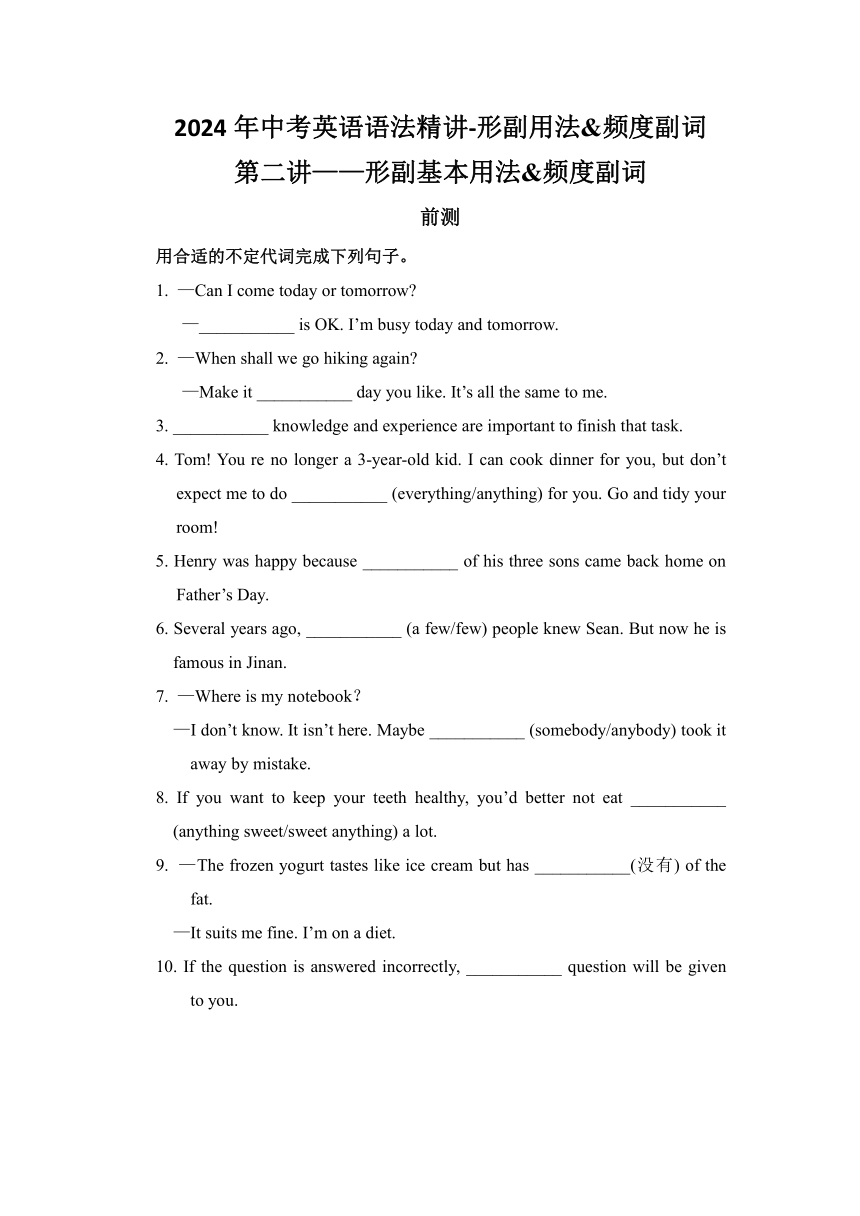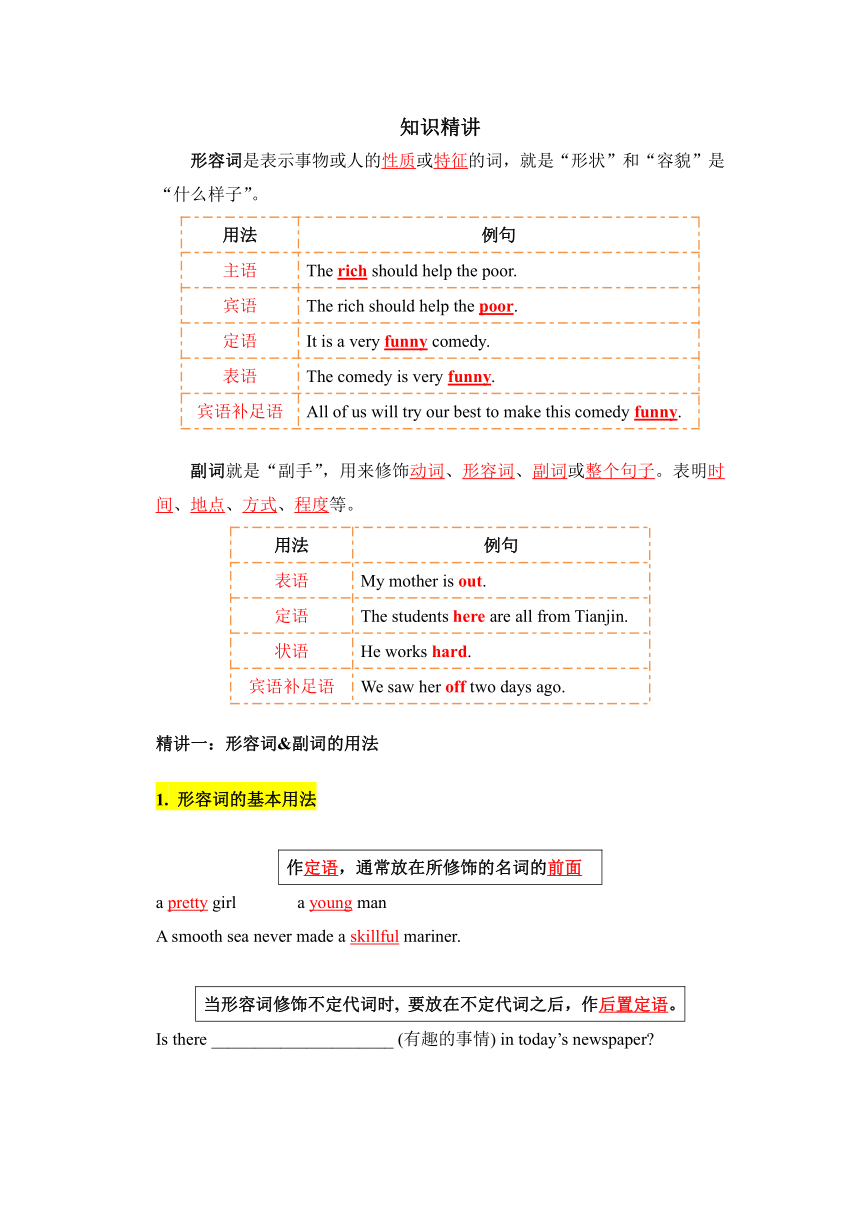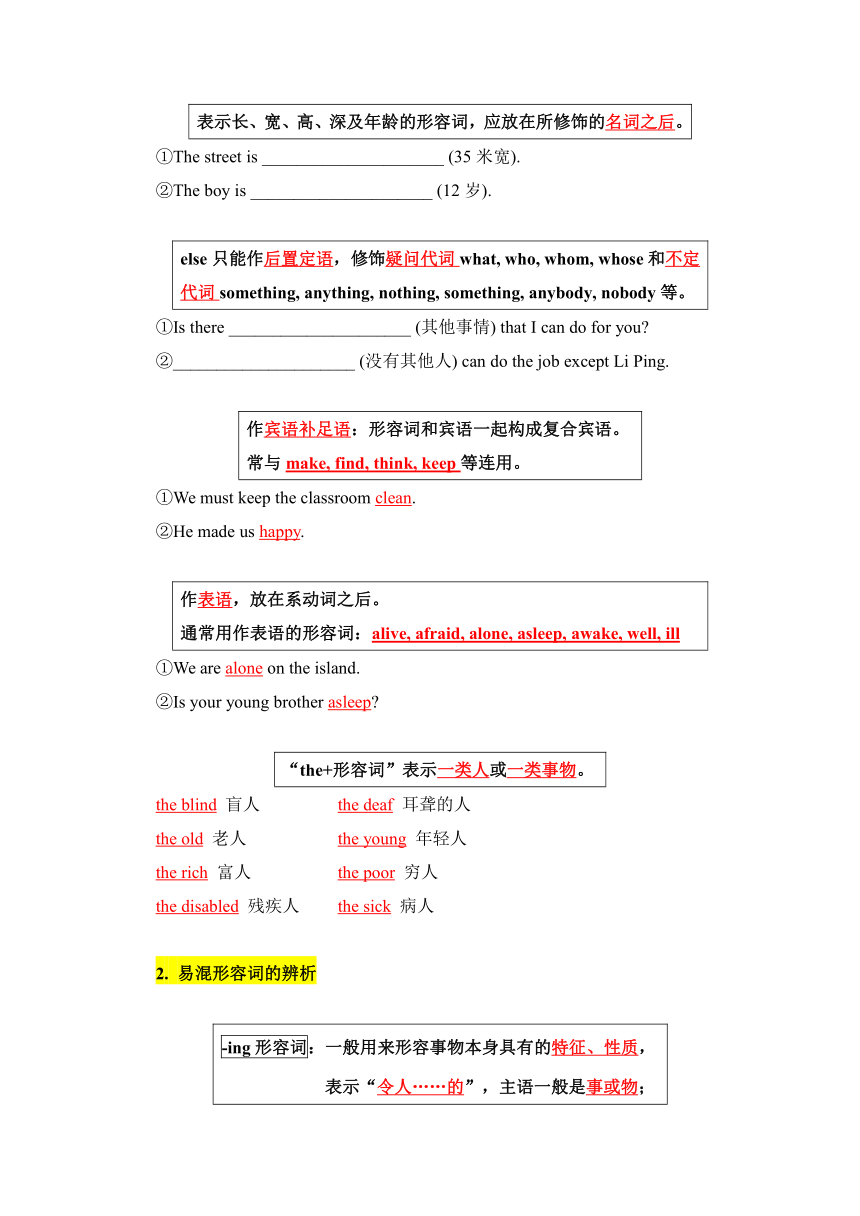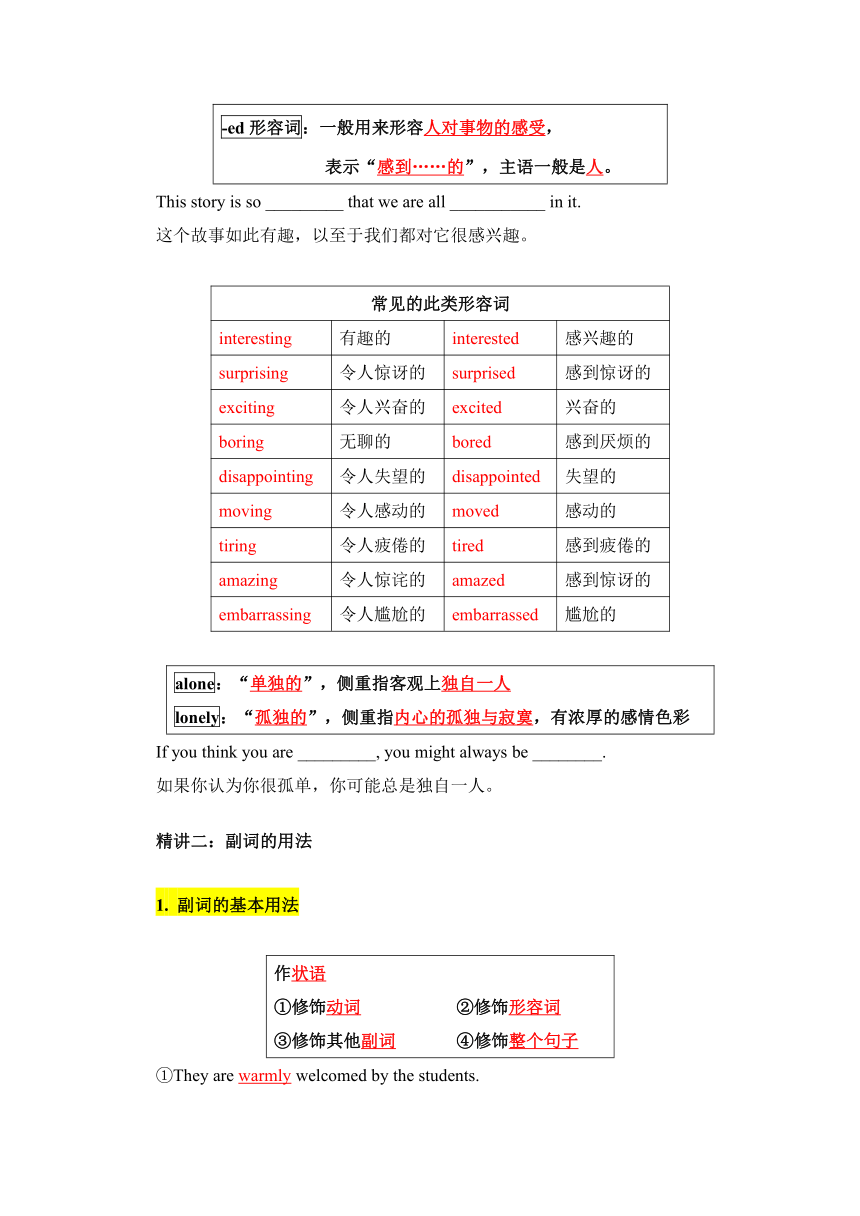2024年人教版中考英语语法精讲—形副基本用法&频度副词(无答案)
文档属性
| 名称 | 2024年人教版中考英语语法精讲—形副基本用法&频度副词(无答案) |  | |
| 格式 | docx | ||
| 文件大小 | 38.3KB | ||
| 资源类型 | 教案 | ||
| 版本资源 | 人教新目标(Go for it)版 | ||
| 科目 | 英语 | ||
| 更新时间 | 2024-05-10 06:44:26 | ||
图片预览





文档简介
2024年中考英语语法精讲-形副用法&频度副词
第二讲——形副基本用法&频度副词
前测
用合适的不定代词完成下列句子。
1. —Can I come today or tomorrow
—___________ is OK. I’m busy today and tomorrow.
2. —When shall we go hiking again
—Make it ___________ day you like. It’s all the same to me.
3. ___________ knowledge and experience are important to finish that task.
4. Tom! You re no longer a 3-year-old kid. I can cook dinner for you, but don’t expect me to do ___________ (everything/anything) for you. Go and tidy your room!
5. Henry was happy because ___________ of his three sons came back home on Father’s Day.
6. Several years ago, ___________ (a few/few) people knew Sean. But now he is famous in Jinan.
7. —Where is my notebook?
—I don’t know. It isn’t here. Maybe ___________ (somebody/anybody) took it away by mistake.
8. If you want to keep your teeth healthy, you’d better not eat ___________ (anything sweet/sweet anything) a lot.
9. —The frozen yogurt tastes like ice cream but has ___________(没有) of the fat.
—It suits me fine. I’m on a diet.
10. If the question is answered incorrectly, ___________ question will be given to you.
知识精讲
形容词是表示事物或人的性质或特征的词,就是“形状”和“容貌”是“什么样子”。
用法 例句
主语 The rich should help the poor.
宾语 The rich should help the poor.
定语 It is a very funny comedy.
表语 The comedy is very funny.
宾语补足语 All of us will try our best to make this comedy funny.
副词就是“副手”,用来修饰动词、形容词、副词或整个句子。表明时间、地点、方式、程度等。
用法 例句
表语 My mother is out.
定语 The students here are all from Tianjin.
状语 He works hard.
宾语补足语 We saw her off two days ago.
精讲一:形容词&副词的用法
1. 形容词的基本用法
作定语,通常放在所修饰的名词的前面
a pretty girl a young man
A smooth sea never made a skillful mariner.
当形容词修饰不定代词时, 要放在不定代词之后,作后置定语。
Is there _____________________ (有趣的事情) in today’s newspaper
表示长、宽、高、深及年龄的形容词,应放在所修饰的名词之后。
①The street is _____________________ (35米宽).
②The boy is _____________________ (12岁).
else只能作后置定语,修饰疑问代词what, who, whom, whose和不定代词something, anything, nothing, something, anybody, nobody等。
①Is there _____________________ (其他事情) that I can do for you
②_____________________ (没有其他人) can do the job except Li Ping.
作宾语补足语:形容词和宾语一起构成复合宾语。 常与make, find, think, keep等连用。
①We must keep the classroom clean.
②He made us happy.
作表语,放在系动词之后。 通常用作表语的形容词:alive, afraid, alone, asleep, awake, well, ill
①We are alone on the island.
②Is your young brother asleep
“the+形容词”表示一类人或一类事物。
the blind 盲人 the deaf 耳聋的人
the old 老人 the young 年轻人
the rich 富人 the poor 穷人
the disabled 残疾人 the sick 病人
2. 易混形容词的辨析
-ing形容词:一般用来形容事物本身具有的特征、性质, 表示“令人……的”,主语一般是事或物; -ed形容词:一般用来形容人对事物的感受, 表示“感到……的”,主语一般是人。
This story is so _________ that we are all ___________ in it.
这个故事如此有趣,以至于我们都对它很感兴趣。
常见的此类形容词
interesting 有趣的 interested 感兴趣的
surprising 令人惊讶的 surprised 感到惊讶的
exciting 令人兴奋的 excited 兴奋的
boring 无聊的 bored 感到厌烦的
disappointing 令人失望的 disappointed 失望的
moving 令人感动的 moved 感动的
tiring 令人疲倦的 tired 感到疲倦的
amazing 令人惊诧的 amazed 感到惊讶的
embarrassing 令人尴尬的 embarrassed 尴尬的
alone:“单独的”,侧重指客观上独自一人 lonely:“孤独的”,侧重指内心的孤独与寂寞,有浓厚的感彩
If you think you are _________, you might always be ________.
如果你认为你很孤单,你可能总是独自一人。
精讲二:副词的用法
1. 副词的基本用法
作状语 ①修饰动词 ②修饰形容词 ③修饰其他副词 ④修饰整个句子
①They are warmly welcomed by the students.
②You are quite right.
③Don’t ride too fast.
④Luckily, I didn’t hurt myself when I fell.
作定语 少数地点副词和时间副词可作定语,放在所修饰词之后。
The teachers here are all very kind to me.
作表语 作表语的副词多数是表示位置的, 如in, out, on, back, down, up, off, away, upstairs等。
①He is in.
②Is the radio on or off
作宾语补足语 作表语的副词多数是表示位置的, 如in, out, on, back, down, up, off, away, upstairs等。
I saw you out with my sister last Sunday.
2. 副词的分类
分类 常见副词 副词位置 示例
时间副词 today, soon, already, now 一般放在句子中动词的后面 I’ll be back soon. 我很快就回来。
地点副词 here, there, home, away, back Don’t go away. 不要离开。
方式副词 well, fast, slowly, carefully Lisa plays the piano very well. 丽萨的钢琴弹得特别好。
程度副词 very, much, almost, enough, so 所修饰的形容词或副词的前面 He speaks so slowly that we all understand him. 他说得那么慢我们都能听懂。
频度副词 always, almost, usually, often, sometimes, seldom, never 常放在所修饰动词之前,有时为加强语气,也可将其放在句首(用倒装)。 He often helps others. 他经常帮助别人。 Never has he come late. 他从来没迟到过。
疑问副词 where, when, why, how, how long 用来构成特殊疑问句或引导从句 Where they will go for their vacation is not decided yet. 他们去哪里度假还没有定。
其他副词 perhaps, too, only, either 有些副词位置很灵活,可放在句首,句中或句尾 Perhaps you are wrong. You are wrong perhaps. You are perhaps wrong. 也许你错了。
即时训练
( ) 1. —You are relaxing yourself here
—Yes. It feels _______ to walk slowly along the river.
A. fantastic B. boring C. strange D. terrible
( ) 2. His grandparents live _______ in a small house, but they don’t feel _______.
A. lonely; alone B. alone; lonely C. lonely; lonely D. alone; alone
( ) 3. —Jack, is there _______ in today’s newspaper
—No, nothing.
A. anything important B. something important
C. important anything D. important something
( ) 4. Mike hurt his back seriously and can _______ get out of bed without help.
A. quickly B. easily C. nearly D. hardly
( ) 5. —Wechat really influences people’s life.
—_______. It is easier for us to keep in touch with others.
A. Mainly B. Exactly C. Simply D. Recently
( ) 6. Don’t talk to anyone about the bad news —_______ not my mother.
A. hardly B. usually C. especially D. simply
精讲三:频度副词
1. 频度副词的含义:表示事情发生频率的副词称为频度副词。
常用的频度副词有:always(总是)﹥usually(通常)﹥often(经常)﹥sometimes(有时)﹥seldom(很少)﹥hardly ever(几乎从不)﹥never(从不)等。
①John ________ comes late. 约翰总是迟到。
②He ___________ exercises. 他几乎从不锻炼。
表示具体的频率、次数时, 一次用once,两次用twice,三次及以上用“基数词+ times”。
①I play football ____________. 我一周踢两次足球。
②She watches TV _______________. 她一周看四次电视。
2. 频度副词在句中的位置
频度副词一般用在实义动词之前,be动词、助动词或情态动词之后,有时为了强调,也可置于句首。
①We ___________ junk food. 我们从不吃垃圾食品。
②Lucy ______________ very busy. 露西有时很忙。
③I ___________ say a word. 我几乎说不出一句话来。
④__________ Jack plays computer game. 有时杰克玩电脑游戏。
3. 对频度副词提问的特殊疑问词组
对频度副词提问时,用how often
—__________ do you exercise 你多久锻炼一次
—Hardly ever. 几乎从不。
即时训练
( ) 1. —Do you know the famous basketball player Kobe has said goodbye to the NBA
—Yes. I’m afraid I will ________ see him on screen.
A. sometimes B. often C. always D. seldom
( ) 2. —Millie, ________ do you take the course in DIY
—Every Saturday afternoon.
A. how long B. how far C. how much D. how often
( ) 3. He is the first to get to school every day. He is ________ late for school.
A. never B. always C. often D. sometimes
( ) 4. —Ms. Lin is very popular with the students.
—Yes. Her classes are ________ lively and interesting.
A. always B. sometimes C. hardly D. never
( ) 5. —________ do you have an English test
—Once a month.
A. How long B. How soon C. How often D. How much
后测
(近年全国中考真题改编)
( ) 1. This kind of sweaters look ________ and sell ________.
A. beautifully; well B. beautiful; well
C. beautifully; good D. beautiful; good
( ) 2. —I know Old Joe lives ________.
—We are supposed to visit him from time to time. Then, he won’t feel ________.
A. alone; alone B. lonely; lonely
C. lonely; alone D. alone; lonely
( ) 3. It is ________ for him to get to school on time, because it is raining ________.
A. hard; hardly B. hardly; hard
C. hard; hard D. hardly; hardly
( ) 4. —What will the weather be like tomorrow
—It will be ________.
A. rain B. rainy C. raining D. to rain
( ) 5. We often exercise to keep ________.
A. health B. healthy C. healthily D. unhealthy
( ) 6. —Would you like ________ to eat
—Yes, please.
A. anything delicious B. delicious anything
C. something delicious D. delicious something
( ) 7. “Let us move a little faster. We do not have ________ time left,” said the tour guide.
A. few B. little C. many D. much
( ) 8. The physics problem is too hard, so ________ students can work it out.
A. little B. few C. a little D. a few
( ) 9. —Why are you so happy, Mr. Wu
—Because the movie yesterday evening was so ________ and it made me ________.
A. moving; moving B. moving; moved
C. moved; moving D. moved; moved
( ) 10. Eating dumplings at the Spring Festival is ________ in China.
A. patient B. lucky C. possible D. traditional
( ) 11. My deskmate is really ________. She likes to attend different activities after school.
A. active B. quiet C. lazy D. honest
( ) 11. Even though we’re in difficult times, we need to keep hope ________.
A. real B. alive C. fresh D. close
( ) 12. —Good news! I got the last ticket to the concert.
—How ________ you are!
A. active B. strange C. lucky D. funny
( ) 13. —Where would you like to spend your winter vacation
—I’d like to go ________. I don’t like cold places.
A. somewhere warm B. warm somewhere
C. anywhere warm D.warm anywhere
( ) 14. —I’ll be away for a long time.
—Don’t worry. She can look after your pet ________.
A. careful enough B. enough careful
C. carefully enough D. enough carefully
( ) 15. —Do you often go fishing with your father
—No, ________. I don't like fishing at all.
A. never B. often C. usually D. sometimes
( ) 16. —________ do people like swimming
—Because it is good for their health.
A. When B. Where C. What D. Why
( ) 17. Seeing a bird resting by the window, the boy moved ________ to have a look at it.
A. politely B. quietly C. easily D. safely
( ) 18. He is ________ in collecting stamps.
A. interesting B. interested C. interests D. interest
( ) 19. They hardly believe the apartment is ________.
A. so little B. such little C. so small D. such small
( ) 20. Li Hua studies English very ________ and her English is very good.
A. careful B. carefully C. careful D. carefully
第二讲——形副基本用法&频度副词
前测
用合适的不定代词完成下列句子。
1. —Can I come today or tomorrow
—___________ is OK. I’m busy today and tomorrow.
2. —When shall we go hiking again
—Make it ___________ day you like. It’s all the same to me.
3. ___________ knowledge and experience are important to finish that task.
4. Tom! You re no longer a 3-year-old kid. I can cook dinner for you, but don’t expect me to do ___________ (everything/anything) for you. Go and tidy your room!
5. Henry was happy because ___________ of his three sons came back home on Father’s Day.
6. Several years ago, ___________ (a few/few) people knew Sean. But now he is famous in Jinan.
7. —Where is my notebook?
—I don’t know. It isn’t here. Maybe ___________ (somebody/anybody) took it away by mistake.
8. If you want to keep your teeth healthy, you’d better not eat ___________ (anything sweet/sweet anything) a lot.
9. —The frozen yogurt tastes like ice cream but has ___________(没有) of the fat.
—It suits me fine. I’m on a diet.
10. If the question is answered incorrectly, ___________ question will be given to you.
知识精讲
形容词是表示事物或人的性质或特征的词,就是“形状”和“容貌”是“什么样子”。
用法 例句
主语 The rich should help the poor.
宾语 The rich should help the poor.
定语 It is a very funny comedy.
表语 The comedy is very funny.
宾语补足语 All of us will try our best to make this comedy funny.
副词就是“副手”,用来修饰动词、形容词、副词或整个句子。表明时间、地点、方式、程度等。
用法 例句
表语 My mother is out.
定语 The students here are all from Tianjin.
状语 He works hard.
宾语补足语 We saw her off two days ago.
精讲一:形容词&副词的用法
1. 形容词的基本用法
作定语,通常放在所修饰的名词的前面
a pretty girl a young man
A smooth sea never made a skillful mariner.
当形容词修饰不定代词时, 要放在不定代词之后,作后置定语。
Is there _____________________ (有趣的事情) in today’s newspaper
表示长、宽、高、深及年龄的形容词,应放在所修饰的名词之后。
①The street is _____________________ (35米宽).
②The boy is _____________________ (12岁).
else只能作后置定语,修饰疑问代词what, who, whom, whose和不定代词something, anything, nothing, something, anybody, nobody等。
①Is there _____________________ (其他事情) that I can do for you
②_____________________ (没有其他人) can do the job except Li Ping.
作宾语补足语:形容词和宾语一起构成复合宾语。 常与make, find, think, keep等连用。
①We must keep the classroom clean.
②He made us happy.
作表语,放在系动词之后。 通常用作表语的形容词:alive, afraid, alone, asleep, awake, well, ill
①We are alone on the island.
②Is your young brother asleep
“the+形容词”表示一类人或一类事物。
the blind 盲人 the deaf 耳聋的人
the old 老人 the young 年轻人
the rich 富人 the poor 穷人
the disabled 残疾人 the sick 病人
2. 易混形容词的辨析
-ing形容词:一般用来形容事物本身具有的特征、性质, 表示“令人……的”,主语一般是事或物; -ed形容词:一般用来形容人对事物的感受, 表示“感到……的”,主语一般是人。
This story is so _________ that we are all ___________ in it.
这个故事如此有趣,以至于我们都对它很感兴趣。
常见的此类形容词
interesting 有趣的 interested 感兴趣的
surprising 令人惊讶的 surprised 感到惊讶的
exciting 令人兴奋的 excited 兴奋的
boring 无聊的 bored 感到厌烦的
disappointing 令人失望的 disappointed 失望的
moving 令人感动的 moved 感动的
tiring 令人疲倦的 tired 感到疲倦的
amazing 令人惊诧的 amazed 感到惊讶的
embarrassing 令人尴尬的 embarrassed 尴尬的
alone:“单独的”,侧重指客观上独自一人 lonely:“孤独的”,侧重指内心的孤独与寂寞,有浓厚的感彩
If you think you are _________, you might always be ________.
如果你认为你很孤单,你可能总是独自一人。
精讲二:副词的用法
1. 副词的基本用法
作状语 ①修饰动词 ②修饰形容词 ③修饰其他副词 ④修饰整个句子
①They are warmly welcomed by the students.
②You are quite right.
③Don’t ride too fast.
④Luckily, I didn’t hurt myself when I fell.
作定语 少数地点副词和时间副词可作定语,放在所修饰词之后。
The teachers here are all very kind to me.
作表语 作表语的副词多数是表示位置的, 如in, out, on, back, down, up, off, away, upstairs等。
①He is in.
②Is the radio on or off
作宾语补足语 作表语的副词多数是表示位置的, 如in, out, on, back, down, up, off, away, upstairs等。
I saw you out with my sister last Sunday.
2. 副词的分类
分类 常见副词 副词位置 示例
时间副词 today, soon, already, now 一般放在句子中动词的后面 I’ll be back soon. 我很快就回来。
地点副词 here, there, home, away, back Don’t go away. 不要离开。
方式副词 well, fast, slowly, carefully Lisa plays the piano very well. 丽萨的钢琴弹得特别好。
程度副词 very, much, almost, enough, so 所修饰的形容词或副词的前面 He speaks so slowly that we all understand him. 他说得那么慢我们都能听懂。
频度副词 always, almost, usually, often, sometimes, seldom, never 常放在所修饰动词之前,有时为加强语气,也可将其放在句首(用倒装)。 He often helps others. 他经常帮助别人。 Never has he come late. 他从来没迟到过。
疑问副词 where, when, why, how, how long 用来构成特殊疑问句或引导从句 Where they will go for their vacation is not decided yet. 他们去哪里度假还没有定。
其他副词 perhaps, too, only, either 有些副词位置很灵活,可放在句首,句中或句尾 Perhaps you are wrong. You are wrong perhaps. You are perhaps wrong. 也许你错了。
即时训练
( ) 1. —You are relaxing yourself here
—Yes. It feels _______ to walk slowly along the river.
A. fantastic B. boring C. strange D. terrible
( ) 2. His grandparents live _______ in a small house, but they don’t feel _______.
A. lonely; alone B. alone; lonely C. lonely; lonely D. alone; alone
( ) 3. —Jack, is there _______ in today’s newspaper
—No, nothing.
A. anything important B. something important
C. important anything D. important something
( ) 4. Mike hurt his back seriously and can _______ get out of bed without help.
A. quickly B. easily C. nearly D. hardly
( ) 5. —Wechat really influences people’s life.
—_______. It is easier for us to keep in touch with others.
A. Mainly B. Exactly C. Simply D. Recently
( ) 6. Don’t talk to anyone about the bad news —_______ not my mother.
A. hardly B. usually C. especially D. simply
精讲三:频度副词
1. 频度副词的含义:表示事情发生频率的副词称为频度副词。
常用的频度副词有:always(总是)﹥usually(通常)﹥often(经常)﹥sometimes(有时)﹥seldom(很少)﹥hardly ever(几乎从不)﹥never(从不)等。
①John ________ comes late. 约翰总是迟到。
②He ___________ exercises. 他几乎从不锻炼。
表示具体的频率、次数时, 一次用once,两次用twice,三次及以上用“基数词+ times”。
①I play football ____________. 我一周踢两次足球。
②She watches TV _______________. 她一周看四次电视。
2. 频度副词在句中的位置
频度副词一般用在实义动词之前,be动词、助动词或情态动词之后,有时为了强调,也可置于句首。
①We ___________ junk food. 我们从不吃垃圾食品。
②Lucy ______________ very busy. 露西有时很忙。
③I ___________ say a word. 我几乎说不出一句话来。
④__________ Jack plays computer game. 有时杰克玩电脑游戏。
3. 对频度副词提问的特殊疑问词组
对频度副词提问时,用how often
—__________ do you exercise 你多久锻炼一次
—Hardly ever. 几乎从不。
即时训练
( ) 1. —Do you know the famous basketball player Kobe has said goodbye to the NBA
—Yes. I’m afraid I will ________ see him on screen.
A. sometimes B. often C. always D. seldom
( ) 2. —Millie, ________ do you take the course in DIY
—Every Saturday afternoon.
A. how long B. how far C. how much D. how often
( ) 3. He is the first to get to school every day. He is ________ late for school.
A. never B. always C. often D. sometimes
( ) 4. —Ms. Lin is very popular with the students.
—Yes. Her classes are ________ lively and interesting.
A. always B. sometimes C. hardly D. never
( ) 5. —________ do you have an English test
—Once a month.
A. How long B. How soon C. How often D. How much
后测
(近年全国中考真题改编)
( ) 1. This kind of sweaters look ________ and sell ________.
A. beautifully; well B. beautiful; well
C. beautifully; good D. beautiful; good
( ) 2. —I know Old Joe lives ________.
—We are supposed to visit him from time to time. Then, he won’t feel ________.
A. alone; alone B. lonely; lonely
C. lonely; alone D. alone; lonely
( ) 3. It is ________ for him to get to school on time, because it is raining ________.
A. hard; hardly B. hardly; hard
C. hard; hard D. hardly; hardly
( ) 4. —What will the weather be like tomorrow
—It will be ________.
A. rain B. rainy C. raining D. to rain
( ) 5. We often exercise to keep ________.
A. health B. healthy C. healthily D. unhealthy
( ) 6. —Would you like ________ to eat
—Yes, please.
A. anything delicious B. delicious anything
C. something delicious D. delicious something
( ) 7. “Let us move a little faster. We do not have ________ time left,” said the tour guide.
A. few B. little C. many D. much
( ) 8. The physics problem is too hard, so ________ students can work it out.
A. little B. few C. a little D. a few
( ) 9. —Why are you so happy, Mr. Wu
—Because the movie yesterday evening was so ________ and it made me ________.
A. moving; moving B. moving; moved
C. moved; moving D. moved; moved
( ) 10. Eating dumplings at the Spring Festival is ________ in China.
A. patient B. lucky C. possible D. traditional
( ) 11. My deskmate is really ________. She likes to attend different activities after school.
A. active B. quiet C. lazy D. honest
( ) 11. Even though we’re in difficult times, we need to keep hope ________.
A. real B. alive C. fresh D. close
( ) 12. —Good news! I got the last ticket to the concert.
—How ________ you are!
A. active B. strange C. lucky D. funny
( ) 13. —Where would you like to spend your winter vacation
—I’d like to go ________. I don’t like cold places.
A. somewhere warm B. warm somewhere
C. anywhere warm D.warm anywhere
( ) 14. —I’ll be away for a long time.
—Don’t worry. She can look after your pet ________.
A. careful enough B. enough careful
C. carefully enough D. enough carefully
( ) 15. —Do you often go fishing with your father
—No, ________. I don't like fishing at all.
A. never B. often C. usually D. sometimes
( ) 16. —________ do people like swimming
—Because it is good for their health.
A. When B. Where C. What D. Why
( ) 17. Seeing a bird resting by the window, the boy moved ________ to have a look at it.
A. politely B. quietly C. easily D. safely
( ) 18. He is ________ in collecting stamps.
A. interesting B. interested C. interests D. interest
( ) 19. They hardly believe the apartment is ________.
A. so little B. such little C. so small D. such small
( ) 20. Li Hua studies English very ________ and her English is very good.
A. careful B. carefully C. careful D. carefully
同课章节目录
